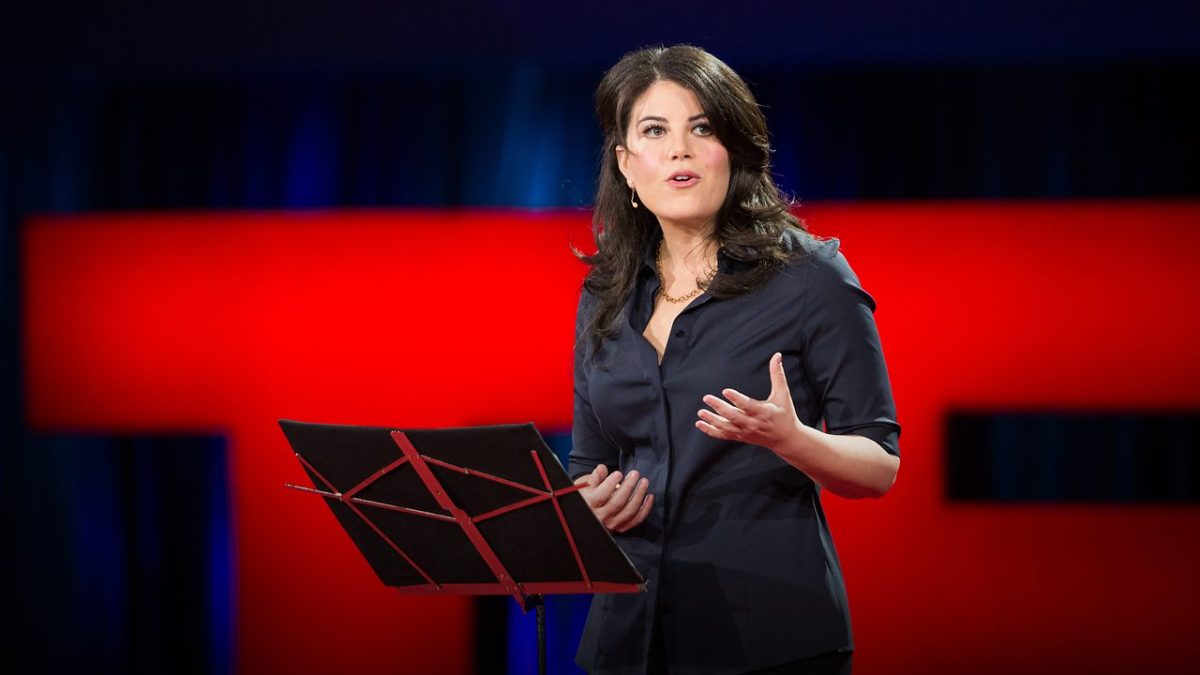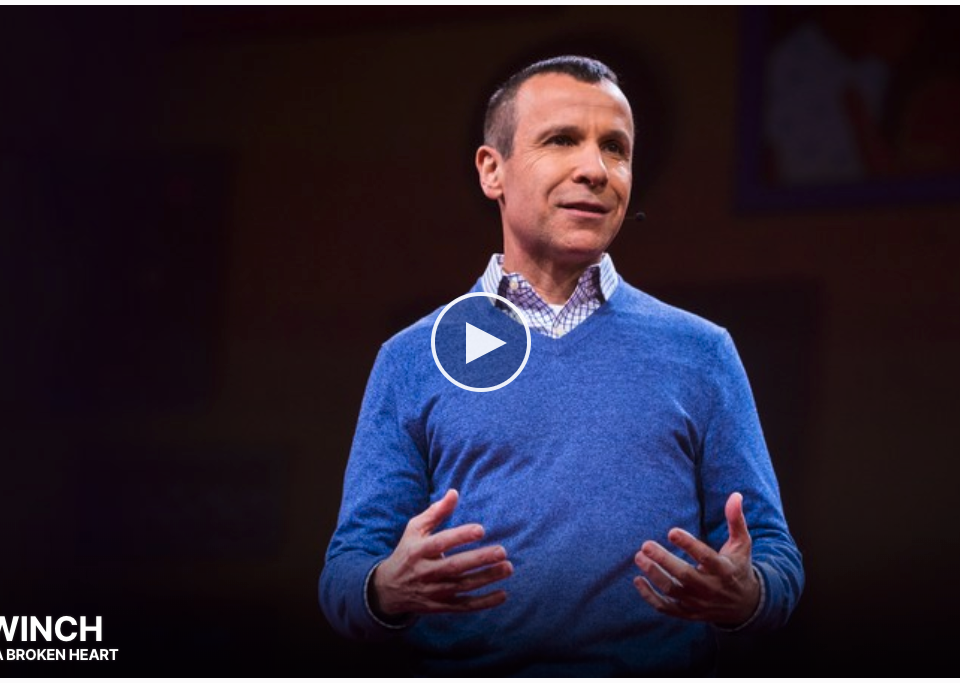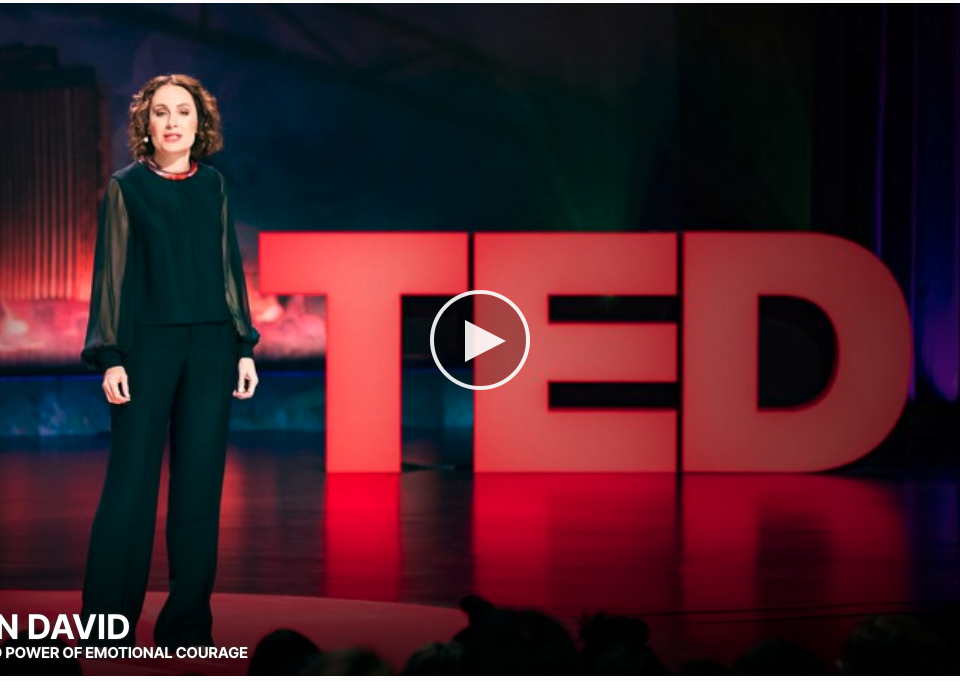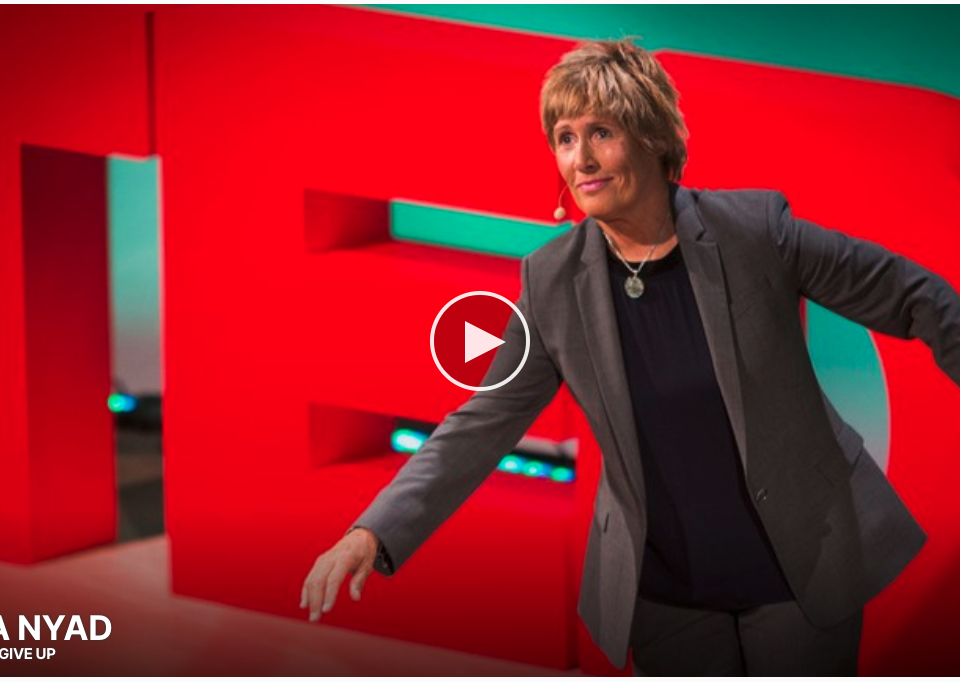
READING: GENERATION “ME”
23 de outubro de 2019
BULLYING AT SCHOOLS
30 de outubro de 2019You’re looking at a woman who was publicly silent for a decade. Obviously, that’s changed, but only recently.
It was several months ago that I gave my very first major public talk at the Forbes 30 Under 30 summit: 1,500 brilliant people, all under the age of 30. That meant that in 1998, the oldest among the group were only 14, and the youngest, just four. I joked with them that some might only have heard of me from rap songs. Yes, I’m in rap songs. Almost 40 rap songs. (Laughter)
But the night of my speech, a surprising thing happened. At the age of 41, I was hit on by a 27-year-old guy. I know, right? He was charming and I was flattered, and I declined. You know what his unsuccessful pickup line was? He could make me feel 22 again. (Laughter) (Applause) I realized later that night, I’m probably the only person over 40 who does not want to be 22 again. (Laughter)(Applause)
At the age of 22, I fell in love with my boss, and at the age of 24, I learned the devastating consequences.
Can I see a show of hands of anyone here who didn’t make a mistake or do something they regretted at 22? Yep. That’s what I thought. So like me, at 22, a few of you may have also taken wrong turns and fallen in love with the wrong person, maybe even your boss. Unlike me, though, your boss probably wasn’t the president of the United States of America. Of course, life is full of surprises.
Not a day goes by that I’m not reminded of my mistake, and I regret that mistake deeply.
In 1998, after having been swept up into an improbable romance, I was then swept up into the eye of a political, legal and media maelstrom like we had never seen before. Remember, just a few years earlier, news was consumed from just three places: reading a newspaper or magazine, listening to the radio, or watching television. That was it. But that wasn’t my fate. Instead, this scandal was brought to you by the digital revolution. That meant we could access all the information we wanted, when we wanted it, anytime, anywhere, and when the story broke in January 1998, it broke online. It was the first time the traditional news was usurped by the Internet for a major news story, a click that reverberated around the world.
What that meant for me personally was that overnight I went from being a completely private figure to a publicly humiliated one worldwide. I was patient zero of losing a personal reputation on a global scale almost instantaneously.
This rush to judgment, enabled by technology, led to mobs of virtual stone-throwers. Granted, it was before social media, but people could still comment online, email stories, and, of course, email cruel jokes. News sources plastered photos of me all over to sell newspapers, banner ads online, and to keep people tuned to the TV. Do you recall a particular image of me, say, wearing a beret?
Now, I admit I made mistakes, especially wearing that beret. But the attention and judgment that I received, not the story, but that I personally received, was unprecedented. I was branded as a tramp,tart, slut, whore, bimbo, and, of course, that woman. I was seen by many but actually known by few.And I get it: it was easy to forget that that woman was dimensional, had a soul, and was once unbroken.
When this happened to me 17 years ago, there was no name for it. Now we call it cyberbullying and online harassment. Today, I want to share some of my experience with you, talk about how that experience has helped shape my cultural observations, and how I hope my past experience can lead to a change that results in less suffering for others.
In 1998, I lost my reputation and my dignity. I lost almost everything, and I almost lost my life.
Let me paint a picture for you. It is September of 1998. I’m sitting in a windowless office room inside the Office of the Independent Counsel underneath humming fluorescent lights. I’m listening to the sound of my voice, my voice on surreptitiously taped phone calls that a supposed friend had made the year before. I’m here because I’ve been legally required to personally authenticate all 20 hours of taped conversation. For the past eight months, the mysterious content of these tapes has hung like the Sword of Damocles over my head. I mean, who can remember what they said a year ago? Scared and mortified, I listen, listen as I prattle on about the flotsam and jetsam of the day; listen as I confess my love for the president, and, of course, my heartbreak; listen to my sometimes catty, sometimes churlish, sometimes silly self being cruel, unforgiving, uncouth; listen, deeply, deeply ashamed, to the worst version of myself, a self I don’t even recognize.
A few days later, the Starr Report is released to Congress, and all of those tapes and transcripts, those stolen words, form a part of it. That people can read the transcripts is horrific enough, but a few weeks later, the audio tapes are aired on TV, and significant portions made available online. The public humiliation was excruciating. Life was almost unbearable.
This was not something that happened with regularity back then in 1998, and by this, I mean the stealing of people’s private words, actions, conversations or photos, and then making them public –public without consent, public without context, and public without compassion.
Fast forward 12 years to 2010, and now social media has been born. The landscape has sadly become much more populated with instances like mine, whether or not someone actually make a mistake, and now it’s for both public and private people. The consequences for some have become dire, very dire.
I was on the phone with my mom in September of 2010, and we were talking about the news of a young college freshman from Rutgers University named Tyler Clementi. Sweet, sensitive, creative Tyler was secretly webcammed by his roommate while being intimate with another man. When the online world learned of this incident, the ridicule and cyberbullying ignited. A few days later, Tyler jumped from the George Washington Bridge to his death. He was 18.
My mom was beside herself about what happened to Tyler and his family, and she was gutted with pain in a way that I just couldn’t quite understand, and then eventually I realized she was reliving 1998, reliving a time when she sat by my bed every night, reliving a time when she made me shower with the bathroom door open, and reliving a time when both of my parents feared that I would be humiliated to death, literally.
Today, too many parents haven’t had the chance to step in and rescue their loved ones. Too many have learned of their child’s suffering and humiliation after it was too late. Tyler’s tragic, senseless death was a turning point for me. It served to recontextualize my experiences, and I then began to look at the world of humiliation and bullying around me and see something different. In 1998, we had no way of knowing where this brave new technology called the Internet would take us. Since then, it has connected people in unimaginable ways, joining lost siblings, saving lives, launching revolutions,but the darkness, cyberbullying, and slut-shaming that I experienced had mushroomed. Every day online, people, especially young people who are not developmentally equipped to handle this, are so abused and humiliated that they can’t imagine living to the next day, and some, tragically, don’t, and there’s nothing virtual about that. ChildLine, a U.K. non-profit that’s focused on helping young people on various issues, released a staggering statistic late last year: From 2012 to 2013, there was an 87 percent increase in calls and emails related to cyberbullying. A meta-analysis done out of the Netherlands showed that for the first time, cyberbullying was leading to suicidal ideations more significantly than offline bullying. And you know what shocked me, although it shouldn’t have, was other research last year that determined humiliation was a more intensely felt emotion than either happiness or even anger.
Cruelty to others is nothing new, but online, technologically enhanced shaming is amplified,uncontained, and permanently accessible. The echo of embarrassment used to extend only as far as your family, village, school or community, but now it’s the online community too. Millions of people, often anonymously, can stab you with their words, and that’s a lot of pain, and there are no perimeters around how many people can publicly observe you and put you in a public stockade.There is a very personal price to public humiliation, and the growth of the Internet has jacked up that price.
For nearly two decades now, we have slowly been sowing the seeds of shame and public humiliation in our cultural soil, both on- and offline. Gossip websites, paparazzi, reality programming, politics,news outlets and sometimes hackers all traffic in shame. It’s led to desensitization and a permissive environment online which lends itself to trolling, invasion of privacy, and cyberbullying. This shift has created what Professor Nicolaus Mills calls a culture of humiliation. Consider a few prominent examples just from the past six months alone. Snapchat, the service which is used mainly by younger generations and claims that its messages only have the lifespan of a few seconds. You can imagine the range of content that that gets. A third-party app which Snapchatters use to preserve the lifespan of the messages was hacked, and 100,000 personal conversations, photos, and videos were leaked online to now have a lifespan of forever. Jennifer Lawrence and several other actors had their iCloud accounts hacked, and private, intimate, nude photos were plastered across the Internet without their permission. One gossip website had over five million hits for this one story. And what about the Sony Pictures cyber hacking? The documents which received the most attention were private emails that had maximum public embarrassment value.
But in this culture of humiliation, there is another kind of price tag attached to public shaming. The price does not measure the cost to the victim, which Tyler and too many others, notably women, minorities, and members of the LGBTQ community have paid, but the price measures the profit of those who prey on them. This invasion of others is a raw material, efficiently and ruthlessly mined, packaged and sold at a profit. A marketplace has emerged where public humiliation is a commodity and shame is an industry. How is the money made? Clicks. The more shame, the more clicks. The more clicks, the more advertising dollars. We’re in a dangerous cycle. The more we click on this kind of gossip, the more numb we get to the human lives behind it, and the more numb we get, the more we click. All the while, someone is making money off of the back of someone else’s suffering. With every click, we make a choice. The more we saturate our culture with public shaming, the more accepted it is, the more we will see behavior like cyberbullying, trolling, some forms of hacking, and online harassment. Why? Because they all have humiliation at their cores. This behavior is a symptom of the culture we’ve created. Just think about it.
Changing behavior begins with evolving beliefs. We’ve seen that to be true with racism, homophobia,and plenty of other biases, today and in the past. As we’ve changed beliefs about same-sex marriage, more people have been offered equal freedoms. When we began valuing sustainability,more people began to recycle. So as far as our culture of humiliation goes, what we need is a cultural revolution. Public shaming as a blood sport has to stop, and it’s time for an intervention on the Internet and in our culture.
The shift begins with something simple, but it’s not easy. We need to return to a long-held value of compassion — compassion and empathy. Online, we’ve got a compassion deficit, an empathy crisis.
Researcher Brené Brown said, and I quote, “Shame can’t survive empathy.” Shame cannot survive empathy. I’ve seen some very dark days in my life, and it was the compassion and empathy from my family, friends, professionals, and sometimes even strangers that saved me. Even empathy from one person can make a difference. The theory of minority influence, proposed by social psychologist Serge Moscovici, says that even in small numbers, when there’s consistency over time, change can happen. In the online world, we can foster minority influence by becoming upstanders. To become an upstander means instead of bystander apathy, we can post a positive comment for someone or report a bullying situation. Trust me, compassionate comments help abate the negativity. We can also counteract the culture by supporting organizations that deal with these kinds of issues, like the Tyler Clementi Foundation in the U.S., In the U.K., there’s Anti-Bullying Pro, and in Australia, there’s Project Rockit.
We talk a lot about our right to freedom of expression, but we need to talk more about our responsibility to freedom of expression. We all want to be heard, but let’s acknowledge the difference between speaking up with intention and speaking up for attention. The Internet is the superhighway for the id, but online, showing empathy to others benefits us all and helps create a safer and better world. We need to communicate online with compassion, consume news with compassion, and click with compassion. Just imagine walking a mile in someone else’s headline. I’d like to end on a personal note. In the past nine months, the question I’ve been asked the most is why. Why now? Why was I sticking my head above the parapet? You can read between the lines in those questions, and the answer has nothing to do with politics. The top note answer was and is because it’s time: time to stop tiptoeing around my past; time to stop living a life of opprobrium; and time to take back my narrative.
It’s also not just about saving myself. Anyone who is suffering from shame and public humiliation needs to know one thing: You can survive it. I know it’s hard. It may not be painless, quick or easy,but you can insist on a different ending to your story. Have compassion for yourself. We all deserve compassion, and to live both online and off in a more compassionate world.
Thank you for listening.
Texto em Português:
Vocês estão diante de uma mulher que ficou em silêncio publicamente por uma década. Obviamente, isso mudou. Mas apenas recentemente.
Foi há alguns meses que fiz meu primeiro discurso público importante na conferência da Forbes, “30 menores de 30”: 1.500 pessoas brilhantes, todas com menos de 30 anos. Isso significa que, em 1998, o mais velho do grupo tinha apenas 14 anos, e o mais novo, apenas quatro. Brinquei com eles que talvez alguns só tenham ouvido falar de mim em músicas de rap. Sim, estou em músicas de rap. Quase 40 músicas de rap.
Mas na noite da minha palestra, algo surpreendente aconteceu. Aos 41 anos de idade, fui cantada por um rapaz de 27. Que coisa, não? Ele era encantador, eu fiquei lisonjeada, mas recusei. Sabe qual foi a cantada infeliz? Que ele poderia me fazer sentir com 22 anos de novo. Depois eu percebi que provavelmente sou a única pessoa acima dos 40 que não quer voltar aos 22 anos.
Aos 22 anos, me apaixonei pelo meu chefe, e aos 24 anos, aprendi as consequências devastadoras disso.
Pode levantar a mão quem nunca cometeu um erro aos 22 anos, ou fez algo de que se arrependeu? É. Foi o que pensei. Então, como eu, aos 22, alguns de vocês podem ter feito escolhas erradas e se apaixonado pela pessoa errada; talvez até mesmo seu chefe. Diferentemente de mim, no entanto, seu chefe provavelmente não era o presidente dos Estados Unidos. Claro, a vida é cheia de surpresas.
Não há um dia sequer em que eu não seja lembrada do meu erro, e lamento profundamente esse erro.
Em 1998, depois de estar envolvida num romance improvável, fiquei no centro de um turbilhão político, jurídico e midiático, como nunca visto antes. Lembrem-se, apenas alguns anos antes, as notícias eram consumidas de apenas três lugares: lendo um jornal ou revista, ouvindo o rádio, ou assistindo à televisão. Era assim. Mas esse não foi o meu destino. Em vez disso, esse escândalo chegou a vocês através da revolução digital. Isso significa que podíamos acessar toda a informação que quiséssemos, quando a quiséssemos, a qualquer hora, em qualquer lugar. Quando a história veio à tona em janeiro de 1998, ela surgiu online. Foi a primeira vez em que o noticiário tradicional foi usurpado pela internet com uma notícia importante, um clique que reverberou pelo mundo.
O significado disso para mim, pessoalmente, foi que, da noite para o dia, passei de uma figura completamente privada a uma publicamente humilhada, no mundo todo. Fui a “paciente zero” em perder sua reputação pessoal numa escala global, quase instantaneamente.
A pressa do julgamento, ativada pela tecnologia, trouxe apedrejadores virtuais aos montes. Isso foi antes das redes sociais, mas as pessoas podiam, ainda assim, comentar online, enviar histórias por e-mail e, claro, mandar piadas cruéis por e-mail. As fontes de notícias espalharam fotos minhas por toda parte para vender jornais, banners de publicidade online, e para manter as pessoas ligadas na TV. Lembram-se de uma imagem minha em particular, digamos, usando uma boina?
Bem, eu admito que cometi erros, especialmente ao usar aquela boina. Mas a atenção e o julgamento que recebi – não a história, mas o que eu pessoalmente recebi – foram sem precedentes.Fui rotulada como vadia, puta, vagabunda, prostituta, interesseira e, claro, como “aquela mulher”. Eu era vista por muitos, mas na verdade conhecida por poucos. E eu entendo: era fácil esquecer que aquela mulher tinha uma dimensão, tinha uma alma e que antes estava intacta.
Dezessete anos atrás, não havia um nome para o que aconteceu comigo. Agora chamamos isso de “cyberbullying” e de assédio virtual. Hoje, quero compartilhar algumas das minhas experiências com vocês, falar sobre como essa experiência ajudou a moldar minhas observações culturais e como espero que minha experiência possa levar a uma mudança que resulte em menos sofrimento para outras pessoas.
Em 1998, perdi minha reputação e dignidade. Perdi quase tudo, e quase perdi a vida.
Deixem-me pintar o quadro para vocês. É setembro de 1998. Estou sentada num escritório sem janelas, no gabinete do promotor independente, sob o zumbido de luzes fluorescentes. Ouço o som da minha voz, minha voz em ligações telefônicas clandestinamente gravadas que uma suposta amiga tinha feito um ano antes. Estou ali porque fui requisitada por lei para autenticar pessoalmente todas as 20 horas de conversas gravadas. Nos últimos oito meses, o conteúdo misterioso dessas fitas pendia como a espada de Dâmocles sobre a minha cabeça. Quem se lembra do que falou um ano atrás? Assustada e mortificada, eu escuto. Escuto minha voz tagarelar sobre as coisas do dia. Escuto eu confessar meu amor pelo presidente, e, claro, minha decepção amorosa. Escuto a mim mesma, às vezes maliciosa, às vezes indelicada, às vezes boba, sendo cruel, impiedosa, vulgar. Escuto profundamente, profundamente envergonhada, a pior versão de mim mesma, um “eu” que nem reconheço.
Alguns dias depois, o relatório Starr foi divulgado no Congresso e todas aquelas fitas e transcrições, palavras furtadas, são parte dele. O fato de as pessoas poderem ler as transcrições já é horrível,mas, algumas semanas depois, as fitas de áudio foram veiculadas na TV e partes significativas ficaram disponíveis online. A humilhação pública foi excruciante. A vida ficou quase insuportável.
Não era algo que acontecia com regularidade em 1998, e me refiro ao furto de palavras, ações, conversas ou fotos privadas para depois tornar tudo público – público sem consentimento, público sem contexto e público sem compaixão.
Doze anos depois, em 2010, as redes sociais já surgiram. O panorama infelizmente se tornou mais repleto de exemplos como o meu, independentemente de se ter de fato cometido um erro ou não, e agora engloba tanto pessoas públicas quanto privadas. As consequências para alguns se tornaram dramáticas, muito dramáticas.
Eu estava ao telefone com minha mãe em setembro de 2010, e falávamos da notícia sobre um jovem calouro da Rutgers University chamado Tyler Clementi. Doce, sensível e criativo, Tyler foi filmado secretamente pelo colega de quarto ao ter relações íntimas com outro homem. Quando o mundo online soube desse incidente, a ridicularização e o cyberbullying começaram. Alguns dias depois,Tyler pulou da ponte George Washington, suicidando-se. Ele tinha 18 anos.
Minha mãe ficou transtornada com o que aconteceu a Tyler e sua família, e ela sofreu muito, de um jeito que eu não conseguia entender. Depois me dei conta de que ela estava revivendo 1998,revivendo uma época em que se sentava na minha cama toda noite, revivendo uma época em que ela me fazia tomar banho com a porta aberta, e revivendo uma época em que meus pais temiam que eu pudesse morrer de tanta humilhação, literalmente.
Hoje, muitos pais não têm tido a chance de agir e resgatar seus entes queridos. Muitos sabem do sofrimento e humilhação de seus filhos quando já é tarde demais. A morte trágica e sem sentido de Tyler foi um momento decisivo para mim. Serviu para recontextualizar minhas experiências, e comecei a olhar o mundo da humilhação e do bullying ao meu redor e a ver algo diferente. Em 1998, não tínhamos como saber aonde essa nova tecnologia audaz chamada internet nos levaria. Desde então, ela tem conectado as pessoas de maneiras inimagináveis, unindo irmãos desaparecidos,salvando vidas, lançando revoluções, mas a escuridão, o cyberbullying e a vergonha que vivenciei se multiplicaram rapidamente. Todo dia na internet, as pessoas, especialmente jovens, que ainda não amadureceram para lidar com isso, são tão assediados e humilhados que não imaginam viver mais um dia, e alguns tragicamente não vivem, e não há nada de virtual nisso. ChildLine, uma organização beneficente que ajuda jovens no Reino Unido, divulgou uma estatística impressionante no ano passado: de 2012 a 2013, houve um aumento de 87% nas ligações e e-mails relacionados a cyberbullying. Uma meta-análise feita fora da Holanda mostrou, pela primeira vez, que o cyberbullying levava a ideações suicidas mais significativamente do que o bullying da vida real. E o que me chocou, ainda que não devesse, foi outra pesquisa do ano passado, mostrando que a humilhação é uma emoção sentida mais intensamente do que a felicidade, ou mesmo a raiva.
A crueldade com os outros não é novidade, mas online, a humilhação tecnologicamente melhorada,é amplificada, incontrolável e permanentemente acessível. O eco da vergonha costumava se estender apenas até a sua família, bairro, escola ou comunidade, mas agora é a comunidade online também. Milhões de pessoas, quase sempre anonimamente, podem apunhalá-lo com palavras e isso é muito doloroso, e não há limite para a quantidade de pessoas que podem observá-lo publicamente e execrá-lo em praça pública. Há um preço muito pessoal pela humilhação pública, e o crescimento da internet elevou esse preço.
Por quase duas décadas, temos lentamente plantado as sementes da vergonha e da humilhação pública em nosso solo cultural, tanto no ambiente virtual como fora dele. Sites de fofocas, “paparazzi”, “reality shows”, política, agências de notícias e às vezes hackers, todos trafegam na vergonha. Isso deu vez à dessensibilização e a um ambiente online permissivo que se presta ao “trolling”, invasão de privacidade e cyberbullying. Essa mudança criou o que o professor Nicolaus Mills chama de cultura da humilhação. Considerem alguns exemplos proeminentes apenas dos últimos seis meses. Snapchat, o serviço usado principalmente pelas gerações mais jovens, afirma que suas mensagens têm vida útil de poucos segundos. Vocês podem imaginar a amplitude do conteúdo que passa por ele. Um aplicativo que os usuários do Snapchat usam para preservar a duração das mensagens foi “hackeado”, e 100 mil conversas privadas, fotos e vídeos vazaram online para agora terem duração eterna. Jennifer Lawrence e muitos outros atores tiveram suas contas iCloud hackeadas, e fotos particulares, íntimas, de nudez, foram jogadas na internet sem permissão.Um site de fofocas teve mais de 5 milhões de cliques por essa única história. E o “cyberhacking” da Sony Pictures? Os documentos que receberam maior atenção foram os e-mails particulares que tinham valor máximo de humilhação pública.
Mas nessa cultura da humilhação, há um outro tipo de etiqueta de preço atrelada à vergonha pública.O preço não mensura o custo para a vítima. O qual Tyler e tantos outros, especialmente mulheres, minorias e membros da comunidade LGBT têm pago, mas o preço mensura o lucro daqueles que os exploram. Essa invasão de privacidade é uma matéria-prima eficiente e desumanamente minada, embrulhada e vendida por lucro. Um mercado emergiu onde a humilhação pública é um produto e a vergonha, uma indústria. Como se ganha esse dinheiro? Cliques. Quanto mais vergonha, mais cliques. Quanto mais cliques, mais dinheiro de publicidade. Estamos em um ciclo perigoso. Quanto mais clicamos nesse tipo de fofoca, mais insensíveis nos tornamos às vidas humanas por trás dele, e quanto mais insensíveis nos tornamos, mais clicamos. Toda hora, alguém está ganhando dinheiro às custas do sofrimento de outra pessoa. A cada clique, fazemos uma escolha. Quanto mais saturamos nossa cultura com a vergonha pública, mais aceitável ela é, mais veremos comportamentos como o cyberbullying, o trolling, algumas formas de hacking e assédio online. Por quê? Porque todos eles têm a humilhação em seu cerne. Esse comportamento é um sintoma da cultura que criamos. Pensem nisso.
A mudança de comportamento começa com a evolução das crenças. Vimos que isso é verdadeiro em relação ao racismo, à homofobia e muitos outros preconceitos atuais e do passado. Assim como mudamos sobre o casamento de pessoas do mesmo sexo, liberdades igualitárias são oferecidas a mais pessoas. Quando começamos a valorizar a sustentabilidade, mais pessoas começaram a se reciclar. Portanto, no que se refere a nossa cultura de humilhação, precisamos de uma revolução cultural. A humilhação pública como esporte sangrento precisa acabar, e é hora de uma intervenção na internet e em nossa cultura.
A mudança começa com algo simples, mas que não é fácil. Precisamos retornar a um antigo valor de compaixão – compaixão e empatia. Na internet, temos um déficit de compaixão, uma crise de empatia.
A pesquisadora Brené Brown disse, e eu a cito: “A vergonha não pode sobreviver à empatia.” “A vergonha não pode sobreviver à empatia.” Passei dias de muita escuridão em minha vida, e foi a compaixão e empatia da minha família, amigos, profissionais, e até mesmo de estranhos que me salvou. Até a empatia de uma só pessoa pode fazer a diferença. A teoria da influência minoritária,proposta pelo psicólogo social Serge Moscovici, diz que, mesmo em números pequenos, quando há consistência por um tempo, a mudança pode ocorrer. No mundo online, podemos fomentar a influência minoritária nos tornando “agentes”. Tornar-se “agente” significa que, em vez da apatia do observador, podemos postar um comentário positivo ou reportar uma situação de bullying. Acreditem, os comentários compassivos ajudam a abater a negatividade. Também podemos combater essa cultura apoiando organizações que lidam com essas questões, como a Fundação Tyler Clementi, nos Estados Unidos. No Reino Unido, há o Anti-Bullying Pro, e na Austrália há o Projeto Rockit.
Falamos muito sobre nosso direito à liberdade de expressão, mas precisamos falar mais sobre nossa responsabilidade com a liberdade de expressão. Todos nós queremos ser ouvidos, mas vamos admitir a diferença entre falar com intenção e falar para ganhar atenção. A internet é a autoestrada para o Id, mas online, demonstrar empatia pelos outros beneficia a todos nós e ajuda a criar um mundo mais seguro e melhor. Precisamos nos comunicar online com compaixão, consumir as notícias com compaixão e clicar com compaixão. Apenas imaginem caminhar um quilômetro na manchete de outra pessoa. Gostaria de finalizar com um comentário pessoal. Nos últimos nove meses, a pergunta que mais me fizeram é por quê. Por que agora? Por que tive a coragem de me pronunciar? Você pode ler nas entrelinhas dessas perguntas, e a resposta não tem nada a ver com política. A principal resposta foi e é: “Porque é hora: hora de parar de pisar em ovos sobre o meu passado; hora de parar de viver uma vida de opróbrio; e hora de resgatar minha narrativa.”
Também não se trata apenas me salvar. Qualquer um que sofre de vergonha e humilhação pública precisa saber de uma coisa: você pode sobreviver a isso. Sei que é difícil. Talvez não seja indolor, rápido ou fácil, mas você pode insistir num final diferente para sua história. Tenha compaixão por você mesmo. Nós todos merecemos compaixão e viver num mundo mais compassivo, tanto online quanto offline.
Obrigada pela atenção.





